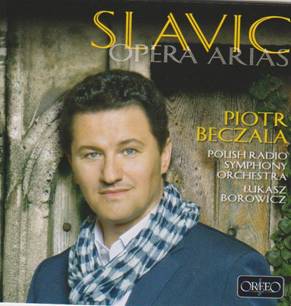CD Orfeo 814101A

PIOTR BECZALA Slavic Opera Arias
CD Orfeo 814101A

This is a brilliant recital and so much more interesting than recent commodities like Alvarez in Verdi or Kaufman in Romantic Arias. Moreover it is far better sung. Compared to his first operatic recital Mr. Beczala has made tremendous progress. When necessary the voice has the slenderness of his countrymen Wieslaw Ochman and Bogdan Paprocki; sometimes it somewhat resembles Gedda’s in his best recordings though the sound is richer, more manly, more spinto though marginally less personal. The top notes are secure and strong and only at the very end of the spectrum there is small push on the breath on the high C’s. I wondered for a moment if the impression. Beczala makes is due to the fact he sings in his own Polish and other Slavic languages but I don’t believe this can be the only reason for the improvement. He clearly has matured as a singer in the two years which separate his recitals. He phrases admirably in this recent record while in his first recital, well sung though it too was, he often gave a rather bland performance in languages he probably had learned by rote. None of this here; these are deeply felt performances which time and again reveal great artistry in a repertoire often handicapped by hammy singing from especially post-revolution (in reality a criminal putsch) times when the art of singing went slowly down the drain in the Soviet Union and the tradition of Sobinov and Smirnov ended with Lemeshev and Vinogradov. But there is more than language and good phrasing alone in the tenor’s performances. He now realizes that a strong high B natural is much more impressive if it is preceded or followed by a finely shaded morendo and a beautiful piano. Take the first track on this CD: the well-known aria from Vladimir in Borodin’s Igor. This is already a classic performance ending on a hauntingly beautiful pianissimo; worthy of the Björling recording (the Swede didn’t have such a note in his repertory). Mr. Beczala (or a clever producer) mixes well known arias with specimens most of us have never heard off. All of the unknown pieces belong to the great romantic tradition when melody reigned supreme and they are very welcome; especially Nowowiejski’s Baltic legend and Zelenski’s Janek. Most opera collectors have records of the opera’s by the best known Polish composer Stanislaw Moniuszko who is of course represented with arias from his Halka and The Haunted Manor. In both arias Beczala supersedes his predecessors by his ardour, beauty of voice and excellent legato. The same composer’s The Raftsman has a barcarolle like aria sung with gusto. In the well known Tchaikovsky pieces Mr. Beczala is on a par with the best though I think that the first aria of Lensky is only included to pleasure Mrs. Beczala, a mezzo soprano, who can now tell she has sung a few phrases as well on record. The aria of Vaudemont in Tchaikovsky’s last opera Iolantha ( a masterpiece that should be in the iron repertory) is sung with warmth and once more proves how beautiful a piano the tenor has. Better known as it often appears on operatic recitals by Russian tenors is the Aleko aria. Most Russians sound coarse compared to Beczala who sings it strongly and convincingly while still being refined and the high C is impressive. In Smetana’s Bartered Bride Beczala has some strong competition from one of the very best records made by Wunderlich and the German tenor still sounds a trifle more impressive (but people told me Wunderllich’s voice was kissed a bit by the mike while Beczala sounds as beautiful in the house as on record). Enough; this is one of the few tenor recitals of these last years that should be in everyone’ s collection and that will remain a classic one long after the many records by Alagna, Villazon etc. have disappeared.
Jan Neckers